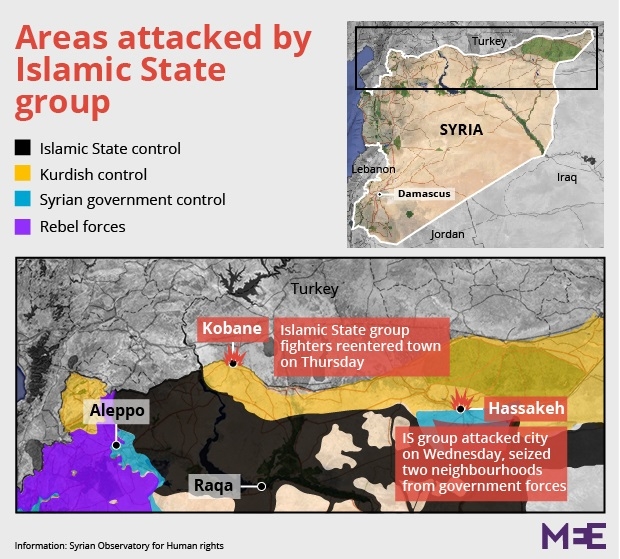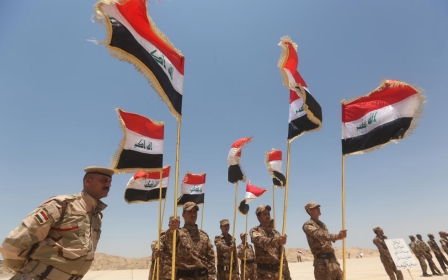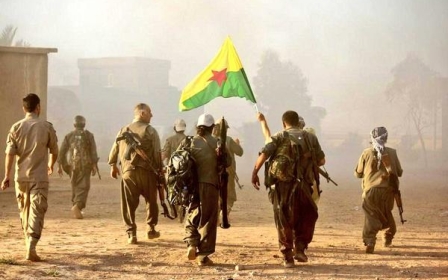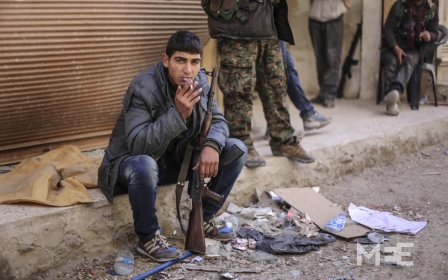Islamic State back in Kobane as suicide blasts and clashes rock town
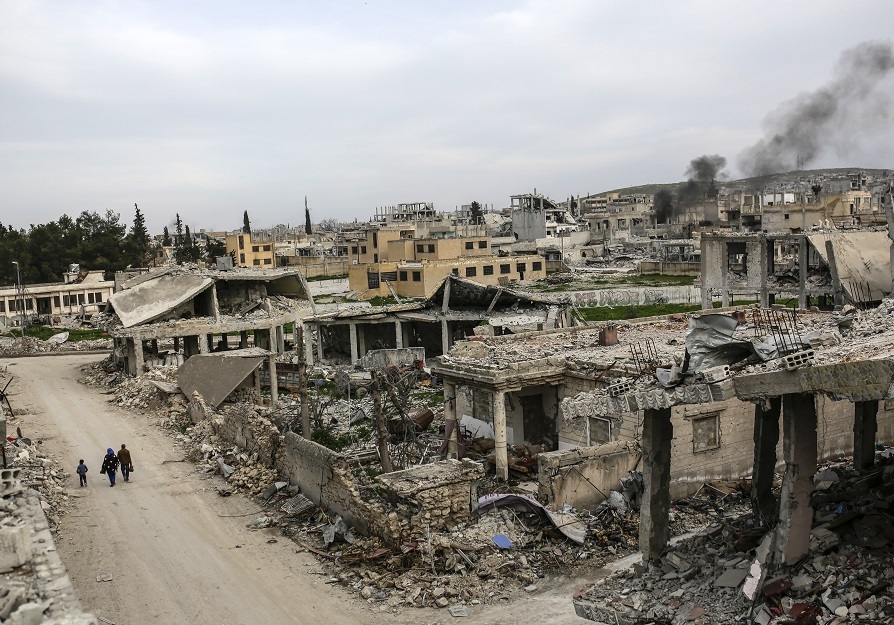
Islamic State militants have launched a fresh offensive to retake the largely Syrian Kurdish border town of Kobane, setting off a large car bomb blast overnight, followed by a second one hours later, a monitoring group said on Thursday.
After the first blast, clashes broke out between Kurdish People’s Protection Units (YPG) and the militants, the Syrian Observatory for Human Rights, a UK-based monitoring group, said.
Dozens of people have been killed or wounded in the blast and the subsequent fighting with clashes is still ongoing, the observatory added, while stressing that it was unable to confirm a final casualty toll as yet.
“IS detonated a suicide bomb in the area near the border crossing with Turkey, killing at least five people,” said observatory director, Rami Abdurrahman. “Fierce clashes erupted afterwards in the centre of the town and there are bodies lying in the streets.”
Islamic State group fighters also executed at least 20 Syrian Kurds, among them women and children, in a village south of the border town of Kobane on Thursday, a monitor said.
"Islamic State forces shot dead at least 20 people in the Kurdish village of Barkh Butan, including women and children and residents who had taken up arms to fight," the Observatory said.
Local activists also confirmed to AFP that at least 20 civilians have been killed since the fighting began.
Omar Kalo, the Kobane-based reporter for Iraqi-based Kurdish news channel Rudaw said that IS was now “driving around Kobane’s alleys and streets killing civilians.
“Three IS car bombs infiltrated Kobane. One of them detonated, one was captured before exploding and one is still missing,” he added, before the second blast was reported.
Anadolu Agency correspondents at the scene reported that the wounded from the blast were rushed through Mursitpinar crossing into Turkey and taken in ambulances to Suruc State Hospital and other facilities in Sanliurfa.
Meanwhile, a crowd has gathered on the Syrian side of the Turkish frontier, prompting security forces to step up measures on the border line, the AA reporter said.
The assault comes some six months after Kurdish forces, backed by heavy US-led coalition bombing and Free Syrian Army troops, managed to boot out IS from the strategically important town after more than four months of fighting.
Since then, the YPG and allied militias have managed to push IS back south and reclaim significant parts of northern Syria, including Tal Abyad, another key border town with Turkey, which IS ceded earlier this month. The Kurdish advances had prompted several thousand refugees to return from Turkey.
“Islamic State’s morale has collapsed after the advance in the Raqqa countryside,” Redur Xelil, the YPG spokesperson told the Guardian after the latest IS offensive. “They are trying to raise the morale of their fighters and supporters, and show that they still have strength and can strike out elsewhere.”
However, it now seems that IS has been able to break through Kurdish lines.
While the media often talks about areas under being under a certain group’s control, Syria’s vast landscape means that most factions only truly hold urban centres and access roads, which means that IS could theoretically sneak through some 30 kilometres of Kurdish-controlled territory without being spotted.
There has also been widespread speculation on social media that Turkey allowed IS to enter Kobane from the north, although Turkey has been quick to deny this and alleges that IS were able to cross from the border town of Jarablus, some 20 kilometres west of Kobane.
Translation: Kobane, which resisted for a month, has fallen in 2 hours?'
Translation: Two days ago the Kurds were on the fringes of Raqqa, with support from the coalition...it could be that Turks supported the fall of Kobane to get back at the coalition
YPG spokesperson Xelil also stressed that IS were hoping that the assult would force Kurdish troops to pull back their positions and allow IS to reclaim lost ground.
But “we will destroy this group that entered the city,” Xelil stressed.
IS also managed to launch a fresh offensive on the north-eastern Syrian city of Hasakah overnight on Thursday. According to the observatory, fierce fighting broke out between troops loyal to Syrian President Bashar al-Assad with IS shelling government positions and setting off several suicide blasts. However, it remains unclear whether the IS drive – the fourth such offensive in the last month – has managed to drive out government forces from large parts of the city.
New MEE newsletter: Jerusalem Dispatch
Sign up to get the latest insights and analysis on Israel-Palestine, alongside Turkey Unpacked and other MEE newsletters
Middle East Eye delivers independent and unrivalled coverage and analysis of the Middle East, North Africa and beyond. To learn more about republishing this content and the associated fees, please fill out this form. More about MEE can be found here.


